In the aftermath of a 2019 homicide, police officers raided the home of Charalambos Theologou — the man shot dead inside a busy Laval, Que., Starbucks last week.
There, according to a police affidavit, they found thousands of dollars in cash, a bulletproof vest and financial records that police said showed Theologou’s involvement in illicit activities.
The financial records, photographs of which appear in a search warrant report consulted by CBC, list what police say were people indebted to Theologou. The debtors include Theologou’s associates, many described by nicknames, and, notably, the names of Montreal-area restaurants.
The records, and the apparent connection between Theologou and the 2019 homicide, show the depth of his alleged involvement in both extortion and in the criminal world, which, according to the authorities, ultimately led to him being shot dead in a brazen daylight hit.
Although Theologou’s criminal convictions, for drug trafficking, conspiracy and firearm possession, date back to the early 2010s and earlier, the search warrant documentation shows police much more recently considered him the head of a prominent and active drug trafficking network.
Theologou, who also went by Bobby the Greek, headed a gang known as the Chomedey Greeks. He also acted as a key player in extorting restaurateurs for protection money, according to Radio-Canada.
When Charalambos Theologou was assassinated in a Starbucks in early October, police were monitoring him so closely that there were undercover officers in the café at that very moment. Court documents and police sources reveal that investigators were well informed about his alleged involvement in both extortion and in the criminal world.
But in 2019, he drew police attention during a murder investigation.
On July 13, 2019, in the early morning hours, Michail Michakis, 35, was gunned down in a parking lot in Laval’s Chomedey neighbourhood.
Michakis, a convicted drug trafficker himself, was a “runner” who moved drugs and collected money for Theologou, according to information in a police affidavit.
Police linked Michakis’s death to organized crime and handed the investigation to the Sûreté du Québec (SQ), Quebec’s provincial police force.

In connection with the homicide, a few weeks later, SQ officers descended on an affluent home and a townhouse in Laval, both belonging to Theologou.
At the home, they found nearly $19,000 in cash, the financial records — some scribbled on a Hilton hotel notepad — and a bulletproof vest. At the townhouse, they found 366 bags of cocaine, $4,100 in cash and 4,640 euros.
Theologou refused to meet with investigators, according to police.
“There is a marked disproportion between [Theologou’s] lifestyle and assets and his legitimate declared revenue,” an SQ investigator wrote in an affidavit.
The financial records include names and amounts. They show more than 50 debtors, which police say all owed money to Theologou.
The debtors’ names appear to include restaurants, or former restaurants, and other businesses in the Montreal area. Some of them are listed alongside amounts of more than $200,000, though the average amount is closer to $10,000.
CBC isn’t identifying the restaurants to avoid associating them with criminal activity.
In addition to being the head of a drug trafficking network, according to police, Theologou also acted as a loan shark.
Neither he nor anyone else was charged in connection with Michakis’s murder. Theologou also faced no charges for possession of the cocaine found at his home.
Video obtained by Radio-Canada shows two people entering and fleeing the café during the incident. The moment the shooting takes place has been removed from the video due to its graphic nature.
Last week, when he was shot alongside two of his associates, who survived, inside a Starbucks located at the corner of the Highway 440 service road and 100th Avenue, undercover police officers who had been tailing Theologou were inside the café, according to Radio-Canada sources.
The SQ said last week that a car found on fire in Montreal’s east end early Thursday morning is believed to be connected to the shooting.
A 2013 Parole Board of Canada decision noted that Theologou had been dealing drugs in prison while serving a sentence for drug trafficking and firearm possession.
The decision noted that Theologou was attracted by money and had a taste for luxury, with little chance for rehabilitation.
“Your involvement in institutional drug trafficking shows that you are not ready to change your ways,” the decision reads. “According to your Case Management Team, considering your present behavior, they evaluate the outcome to be rather bleak.”







